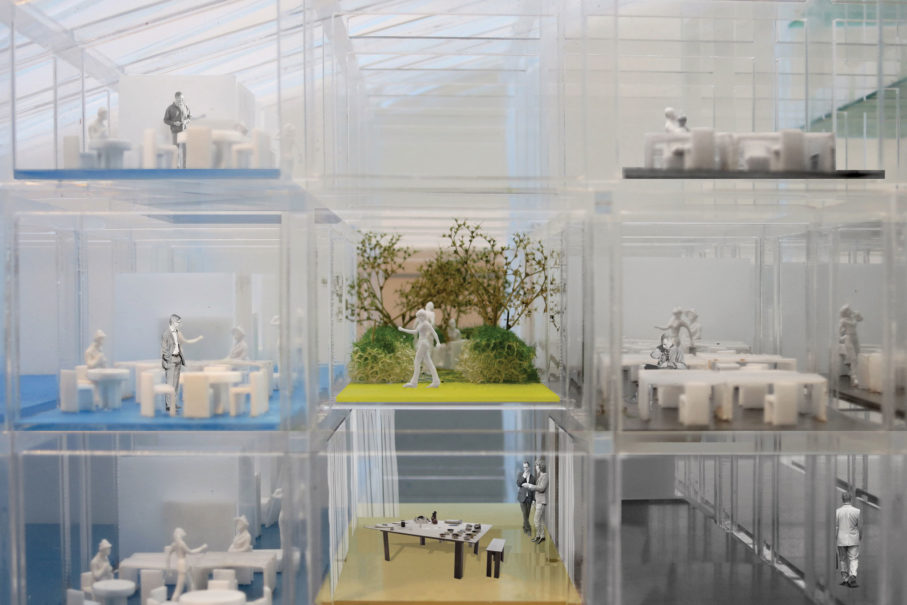
© 2016, Herzog & de Meuron
The Royal College of Art (RCA) announced today that Herzog & de Meuron has won the invited competition to appoint architects for its new state-of-the-art £108m Battersea South campus.
The acclaimed practice, a laureate of both the Pritzker Architecture Prize and the Praemium Imperiale, was the clear choice of the competition jury, who assessed an exceptional shortlist of seven international architectural practices.
The competition – for a strategic design approach to a new centre for the world’s pre-eminent art and design university’s Battersea campus – was distinctive for its strong engagement with the existing College buildings and wider surroundings in Battersea.
The six runner-up practices (in alphabetical order) were:
- Christian Kerez (Switzerland)
- Diller Scofidio + Renfro (US)
- Lacaton & Vassal (France)
- Robbrecht en Daem architecten (Belgium)
- Serie Architects (UK/Singapore)
- Studio Gang (US)
The RCA is transforming into a dynamic STEAM-focused graduate university (Science, Technology, Engineering, Art, and Mathematics/Medicine), expanding its research and knowledge exchange centres into the domains of computer and materials science, the impact of the digital economy, advanced manufacturing and intelligent mobility.
Bringing together the worlds of science, art, design and technology, the RCA aims to make a transformational impact in areas such as: connected cities; robotics, the internet of things and intelligent mobility; and sustainability, mass migration and city design.
The Competition Jury declared that Herzog & de Meuron’s approach demonstrated a deep understanding of the potential for Battersea, making new connections and foreseeing the possibilities for sustainable place-making. Their concept provided a clear organisational structure and showed an acute sensibility in mapping the complex objectives in the brief.
Dr Paul Thompson, Rector of the RCA and Chair of the Architectural Selection Panel (ASP), said:
‘We set out a competition to find the very best architect to crystallise our vision for a new heart to the Battersea campus; we were very impressed by Herzog & de Meuron’s mastery of our brief. We are looking forward to working with Herzog & de Meuron to develop a concept, in consultation with our partners and stakeholders.’
Professor Naren Barfield, Pro Rector of the RCA and ASP member, said:
‘We wanted to find an architect that truly understood the nature of the RCA’s vision and design practices, and could conceptualise a building that is both innovative and flexible, able to adapt to the emerging disciplines and collaborations that will define the future. Herzog & de Meuron’s approach concept embraces all of these factors and gives us a new configuration of space typologies to explore the expanding frontiers in learning and research in art and design, and especially where these meet technology, engineering and science to transform STEM to STEAM.’
Dr Adrian Lahoud, Dean of Architecture and ASP member, added:
‘We would like to thank all the shortlisted teams for the intelligence of their provocations and the richness of their ideas. It was an ambitious brief that invited participants into our own thought process at a very early stage. It demanded foresight, sensitivity, and rigour, which every entry lived up to in its own way, providing a fascinating sample of thinking on the future of art and design education. The selection process was always going to be difficult. We are all looking forward to working closely with the team at Herzog & de Meuron on the next phase.’
Marcus Cole, RCA Architecture, RIBA Part 2 student and ASP member, said:
‘It was a privilege to observe and contribute to the competition’s adjudication. As a student, it is rare to have the opportunity to engage with different approaches at such a high level. As the RCA works with Herzog & de Meuron to shape the design, I am delighted to be bringing the student’s voice to the process.’
Malcolm Reading, Competition Director, said:
‘The exceptional shortlist was a measure of the RCA’s influence and standing in the design community worldwide. We had an outstanding field and the winning concept illustrates a depth of understanding about spaces that can stimulate an interaction between disciplines as well as anchoring the new campus into Battersea. It was a pleasure to work with the RCA to organise this global search.’
Pierre de Meuron, Herzog & de Meuron, said:
‘We are delighted to win the competition. The RCA set a challenging brief to look forward and visualise the spaces they will need to deliver innovation and expertise. The Battersea site offers an opportunity to rethink the RCA campus and establish the patterns of connectivity and organisation that will make a successful building.’
Ascan Mergenthaler, Senior Partner, Herzog & de Meuron, said:
‘We took our inspiration from the RCA ethos of experiment and making to explore the possibilities of spatial organisation, and to test the physical expression of bringing together the worlds of science, art, design and technology under one roof.’
Working closely with the RCA, competition organisers Malcolm Reading Consultants developed a competitive selection model that combined an invited process for creative leadership alongside the selection of other professional services from the Multidisciplinary Panel, a widely-used technical framework operated by the Homes and Communities Agency (HCA). The seven finalist teams were selected from a total of ninety-seven Expressions of Interest received from practices around the world.
The Royal College of Art will now work with Herzog & de Meuron and Mott MacDonald & Equals Consulting, who are leading the multidisciplinary professional team, to develop the initial concept design.

